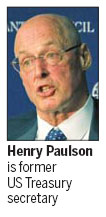Paulson sees no hard landing for China
Updated: 2012-07-18 11:14
By Tan Yingzi in Washington (China Daily)
|
||||||||

China still has considerable room in which to adjust economic policy and won't face a "hard landing" this year, former US Treasury secretary Henry Paulson said on Tuesday.
Just back from a trip to China, the man who led President George W. Bush's 2008 bailout of Wall Street shared observations about the country and his new blueprint for upgrading economic relations between the world's two biggest economic powers.
"There's no doubt that the economy has slowed down significantly, and in a number of areas, really slowed down," Paulson said in an address at the Atlantic Council, a think tank in Washington.
"My own best judgment is that we're not going to see a hard landing," he added.
Economists describe a hard landing as a severe slowdown or even contraction into recession of a country's gross domestic product, following a period of rapid growth. The cause is often a government's attempts to control inflation by tightening the money supply.
Last week, China reported that its economy grew 7.6 percent in the second quarter, the lowest rate in more than three years. On Monday, the International Monetary Fund lowered its estimates for Chinese growth for this year and 2013, warning of the possibility of a hard landing in the medium term for the world's No 2 economy. The IMF dropped its forecast for this year's GDP growth to 8.0 percent from its forecast of 8.2 percent in April. It also cut its estimate of next year's growth rate to 8.5 percent from 8.8 percent previously.
Paulson, who met with dozens of government and business leaders on his recent trip, said Chinese have recognized and begun to address problems posed by the overheated real estate market and inflation.
"There is a lot of room in their economy - unlike ours - to respond positively to monitor the economy, loosening up lending and so on," he said. "I will be quite surprised if they don't grow somewhere between 7.5 to 8 percent this year."
But the bigger challenge for China will come three to five years from now, when its growth model, which is mainly driven by investment, exports and consumption, is "running out of steam" and reforms are lagging.
The former top executive of Goldman Sachs Group Inc who as Bush's Treasury secretary oversaw the rescue of it and other Wall Street banks, is now in academia. In 2011, he founded the Paulson Institute at the University of Chicago with an initial emphasis on strengthening the US-China relationship through trade and investment.
He has written A New Framework for US-China Economic Relations, a tract that urges the two countries to maintain close economic ties, even as a US consensus supporting this is eroding after more than 40 years. He recommends that Washington and Beijing push through reforms to adjust to new conditions.
"Our best interest is having a constructive relationship with China," he said during the talk at the think tank. "There is a great opportunity in the economic area to break ground and do things that will benefit our economy, the global economy and China.
"For our part, the United States needs a level playing field in China," Paulson's report adds. "But we would benefit, too, from more investment from China."
The US needs to ensure greater openness to Chinese investment, grant China market-economy status on a sector-by-sector basis and reform its outdated export control system, he wrote.
Pointing out that China has been investing heavily abroad since 2009, Paulson believes this trend will accelerate over the next decade and that it's in the interest of the US to garner a "fair share" of Chinese investment cash. But the US is "lagging way behind" in attracting capital from Chinese investors, he said, because "they feel unwelcome here" and "are confused by the different regulatory constraints and are put off by them".
For its part, China should pursue reforms to make the yuan a currency whose value is determined by the market, open up its capital markets, increase transparency and enforce intellectual-property commitments, Paulson writes.
tanyingzi@chinadailyusa.com

 Relief reaches isolated village
Relief reaches isolated village
 Rainfall poses new threats to quake-hit region
Rainfall poses new threats to quake-hit region
 Funerals begin for Boston bombing victims
Funerals begin for Boston bombing victims
 Quake takeaway from China's Air Force
Quake takeaway from China's Air Force
 Obama celebrates young inventors at science fair
Obama celebrates young inventors at science fair
 Earth Day marked around the world
Earth Day marked around the world
 Volunteer team helping students find sense of normalcy
Volunteer team helping students find sense of normalcy
 Ethnic groups quick to join rescue efforts
Ethnic groups quick to join rescue efforts
Most Viewed
Editor's Picks

|

|

|

|

|

|
Today's Top News
Health new priority for quake zone
Xi meets US top military officer
Japan's boats driven out of Diaoyu
China mulls online shopping legislation
Bird flu death toll rises to 22
Putin appoints new ambassador to China
Japanese ships blocked from Diaoyu Islands
Inspired by Guan, more Chinese pick up golf
US Weekly

|

|






